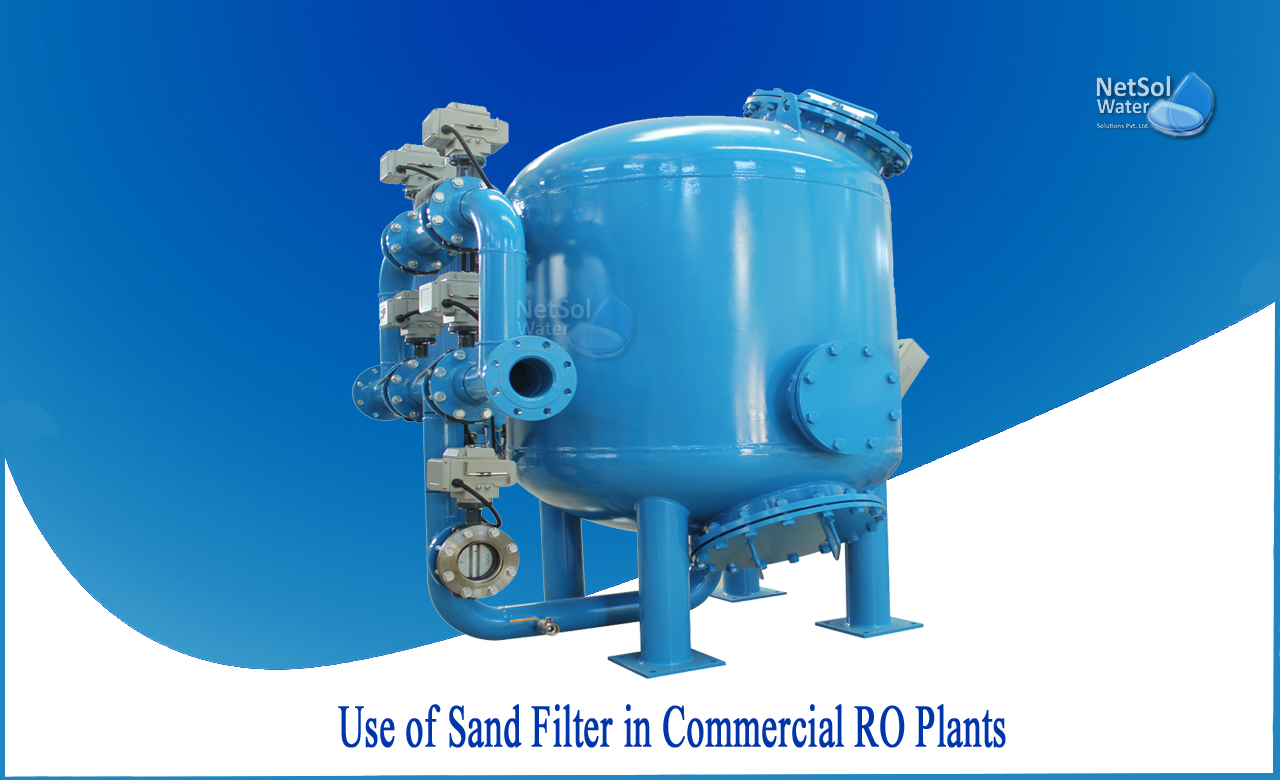History of Filtration for Water Purification
Filter materials were already in use throughout ancient times, therefore separation processes have a long history.
Filling sieve containers with rushes and genista plants separated solid and liquid materials. Filtering drinking water, wine, and other liquids was also done by the Egyptians using porous clay jars.
What is the Use of Sand filter in Commercial RO Plants?
A depth filter, such as a sand bed filter, is a type of filter used for separating particulates from fluids. There are two types of filters:
1: Surface filters: Particulates are trapped on a porous surface in surface filters.
2: Depth filters: Particulates are collected within a porous body of material in depth filters.
Sedimentation tanks, self-cleaning screen filters, hydrocyclones, and centrifuges are examples of passive and active equipment for solid-liquid separation.There are several different types of depth filters, some of which use fibrous materials and others which use granular materials. Granular loose media depth filters, such as sand bed filters, are one example. They are often used to remove tiny quantities of fine particles (100 micrometers) from aqueous solutions (10 parts per million or 10 g per cubic meter).
Furthermore, rather of capturing the solids as a valuable commodity, they are typically employed to purify the fluid. As a result, the majority of their applications are in the treatment of liquid effluent (wastewater).
Functioning of Sand filters
The functioning concept of a Sand filter is rather simple. Water passes through many layers of filter material in a pressure sand filter, including reviewed sand, rocks, and rock layers. The impurities in the water are collected in the media bed, and the sifted water is pumped into the tanks' discharge manifold. Discharging is the next stage, which entails properly expelling trapped pollutants from the media bed. After back washing, the filter is flushed with raw water, and the filter is returned to support after the needed nature of water has been achieved.
Sand filtration is a popular and effective method for removing suspended particles from water. The filtering medium is made up of many layers of sand of various sizes and specific gravity. Sand filters are available in a variety of sizes and materials, and can be operated manually or mechanically.
In the pressure sand filter, a raw water pump is employed to generate the necessary working pressure. To minimize the suspended particles in the raw water, it is passed through a RWT Pressure Sand Filter at a pressure of 3.5 kg/cm2. It is generally used before RO Membrane process in RO Plants.
The filter successfully reduces suspended particles to less than 5 ppm by removing up to 30- 50 micron. The filter will need to be rinsed every day for 20 to 30 minutes with raw water.
Applications of Sand Filters
1: Cooling water preparation
2: Waste water treatment
3: Drinking water production
4: Swimming pool filtration
5: Membrane systems require pre-filtration (RO Plants)
6: Gray or surface water filtration
Mechanisms for capturing particulate solids
Sand bed filters operate by giving particulate particles many chances to be caught on a sand grain's surface. Particulates get near to sand grains when fluid moves through porous sand along a convoluted path.
One of numerous techniques can be used to catch them:
1: Direct collision
2: Van der Waals or London force attraction
3: Surface charge attraction
4: Diffusion
Furthermore, surface charge repulsion can prevent particle solids from being collected if the sand's surface charge is the same sign (positive or negative) as the particulate solids. Furthermore, collected particles can be dislodged, however they may be re-caught at a deeper depth inside the bed. Finally, a sand grain polluted with particle solids may become more appealing or reject further particulate solids. This can happen if a particle loses its surface charge while sticking to the sand grain, making it appealing to other particulates.
What can we offer?
Conserve resources for the future by partnering with Netsol Water, a well-known water and wastewater management company in Greater Noida. We offer a variety of water and wastewater treatment services throughout India, utilizing the most up-to-date equipment and advanced technologies. We provide innovative wastewater treatment services, sewage treatment plant design, effluent recycling treatment, and a variety of other services. Our water and wastewater treatment systems are highly effective at removing a wide range of chemical, physical pollutants, and biological contaminants.
For further information,call us on+91 9650608473 or email at enquiry@netsolwater.com



